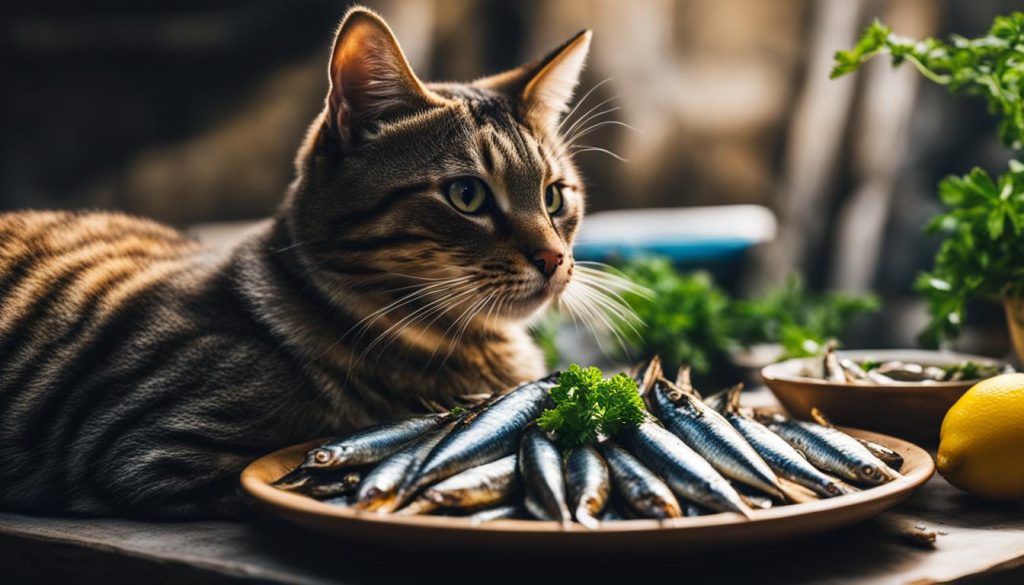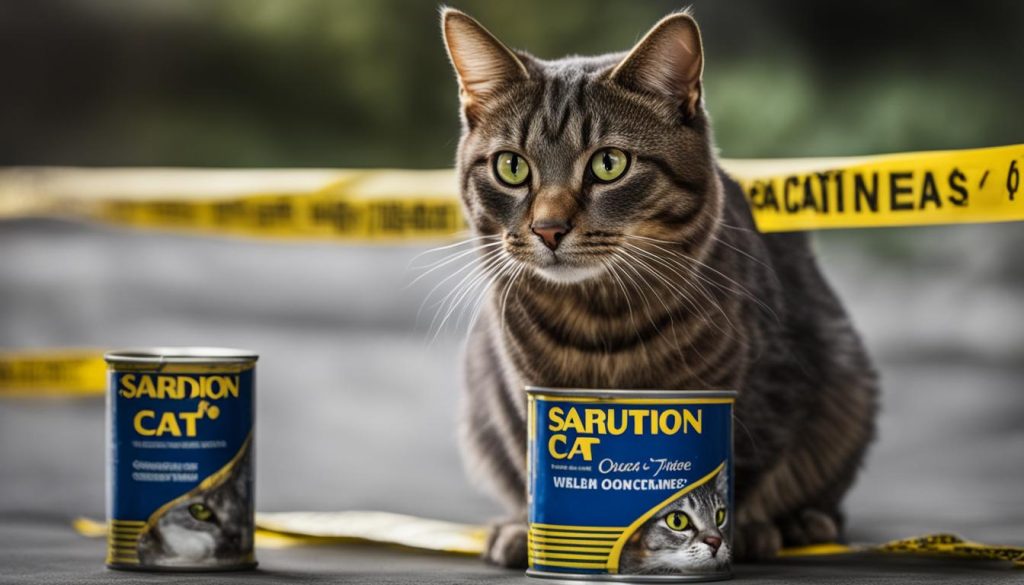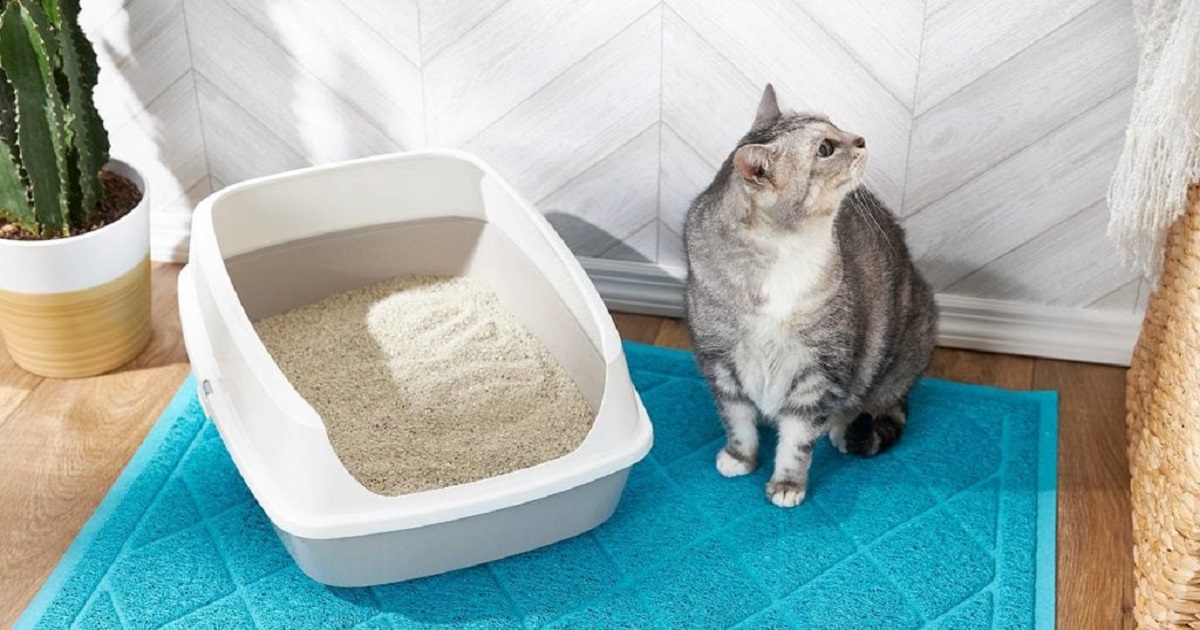As a cat owner, I’m always on the lookout for healthy and tasty treats to spoil my feline friend. One treat that often comes to mind is sardines. But can cats eat sardines? Are they truly cat-friendly? Let’s explore the benefits of sardines for cats and determine if they are a safe addition to their diet.
Can Cats Eat Sardines? Yes, indeed they can.
- Sardines are safe for cats and can be a beneficial treat when given in moderation.
- They are rich in Omega-3 fatty acids, which promote healthy skin and coat.
- Sardines provide essential protein for muscle development and maintenance in cats.
- They supply cats with taurine, an important nutrient for vision, heart function, and immune system.
- However, sardines should not substitute a balanced diet and should only be given as an occasional treat.
Nutritional Value of Sardines for Cats
Sardines are a nutritional powerhouse for cats, providing a wide range of benefits. These small fish are packed with Omega-3 fatty acids, which are essential for maintaining healthy skin and coat. The Omega-3 fatty acids also promote heart health and have anti-inflammatory properties, helping to keep your cat’s cardiovascular system in top shape.
Furthermore, sardines are an excellent source of protein, supplying the essential amino acids needed for muscle development and maintenance. Additionally, they are rich in taurine, a crucial nutrient for a cat’s vision, heart function, and immune system.
Sardines also contain important vitamins, such as vitamin B12, which plays a key role in heart health. This vitamin supports the production of red blood cells, ensuring that your cat’s cardiovascular system functions optimally.
However, it’s essential to remember that sardines should be given to cats in moderation as part of a balanced diet. Although they offer numerous nutritional benefits, sardines should not replace a complete cat food diet and should be treated as an occasional treat.

Additional Notes:
In addition to their high nutritional value, sardines are also a flavorful treat that many cats adore. When selecting sardines for your feline companion, opt for those packed in water rather than oil to avoid unnecessary fat intake. Avoid sardines packed in tomato sauce as well, as the spices and additives can upset a cat’s digestive system.
Remember to always read the labels and select sardines that are safe for cats. And as with any dietary changes, it’s important to consult with your veterinarian to ensure that sardines are appropriate for your individual cat’s needs and health conditions.
Choosing the Right Sardines for Cats
When feeding sardines to cats, it’s important to choose the right type. Sardines packed in water are a better choice than those packed in oil, as the oil can add unnecessary fat to the cat’s diet. It’s also important to avoid sardines packed in tomato sauce, as the spices and additives can upset a cat’s digestive system. Other canned fish such as salmon or mackerel can be good alternatives, but they should also be packed in water and without added salt. Always read the labels and choose sardines that are safe for cats.
Feeding sardines to cats can provide them with essential nutrients, but it’s crucial to select the best sardines for cats to ensure their well-being. Opting for sardines packed in water instead of oil helps manage their fat intake. Avoiding sardines in tomato sauce prevents any digestive issues due to spices and additives. Similarly, considering alternative canned fish like salmon or mackerel can provide variety while prioritizing their health. Remember, always check the labels for cat-friendly options when choosing sardines.
Potential Risks of Feeding Sardines to Cats
While sardines can be a safe and beneficial treat for cats, it’s important to be aware of potential risks. Canned sardines, like many processed foods, often contain added salt. While a small amount of salt is generally safe for cats, excessive salt intake can be harmful and lead to salt poisoning.
Symptoms of salt poisoning in cats can include vomiting, diarrhea, increased thirst, and kidney damage. To minimize the risk of salt poisoning, it’s important to choose sardines with low sodium content or rinse the sardines to remove excess salt before feeding them to your cat.
Another consideration when feeding sardines to cats is the presence of bones. While sardine bones are generally soft and pose less of a choking hazard than bones from other fish, it’s still important to remove them before offering sardines to your cat. Take the time to carefully check the sardines and ensure that no bones remain.
Additionally, sardines should not make up a large portion of a cat’s diet. They should only be given as an occasional treat, as part of a balanced diet. While sardines provide valuable nutrients, such as Omega-3 fatty acids and protein, they should not be the sole source of nutrition for your cat.

While sardines can be a nutritious treat for cats, it’s important to be mindful of the potential risks associated with their consumption. Ensure that the sardines you choose have low sodium content or rinse them to remove excess salt. Always remove bones before feeding sardines to your cat to reduce the risk of choking. Finally, remember that sardines should only be given as an occasional treat and should not make up a large portion of your cat’s diet.
Introducing Sardines to a Cat’s Diet
When it comes to incorporating sardines into a cat’s diet, it’s important to take a gradual approach. Start by introducing a small amount and carefully observe your cat for any changes in behavior or digestive upsets. Remember, kittens can also enjoy the benefits of sardines, but in smaller portions that are appropriate for their size.
Consulting with a veterinarian is crucial when it comes to determining the right portion sizes and making dietary changes for your cat. Each cat is unique and may have specific nutritional needs or restrictions, so professional guidance ensures that you’re providing the best care for your feline friend.
Additionally, it’s vital to remember that sardines should be part of a balanced diet and not the sole source of nutrition for your cat. A well-rounded meal plan that includes other cat-friendly foods is essential for maintaining optimal health.
Conclusion
Sardines can be a tasty and nutrient-rich addition to a cat’s diet. They provide essential nutrients such as Omega-3 fatty acids, protein, and taurine, which promote overall health and well-being. However, it’s crucial to feed sardines to cats in moderation and as part of a balanced diet.
When choosing sardines for cats, opt for those packed in water instead of oil to avoid unnecessary fat intake. Avoid sardines packed in tomato sauce or with added spices, as these can upset a cat’s digestive system. Ensure that the sardines you choose are safe for cats by reading the labels carefully.
While sardines offer numerous benefits, there are potential risks to consider. Cats should not consume excessive amounts of sodium, so it’s important to keep an eye on the salt content in canned sardines. Additionally, remember to remove any bones from the sardines before feeding them to cats to prevent choking hazards. Always consult with a veterinarian to determine the appropriate portion sizes and to ensure that sardines are included as part of a well-rounded feline diet.
Sardines can be a delicious and nutritious treat for cats. They provide valuable nutrients that contribute to a cat’s overall health and should be given as an occasional addition to their diet. By following these guidelines and seeking professional advice, cat owners can safely incorporate sardines into their feline companion’s meal plan and provide them with a varied and balanced diet.
FAQ
Can cats eat sardines?
Yes, sardines can be a safe and beneficial treat for cats.
Are sardines safe for cats?
Sardines are safe for cats when given in moderation as part of a balanced diet.
What are the benefits of sardines for cats?
Sardines are rich in Omega-3 fatty acids, which promote healthy skin and coat, and provide essential protein for muscle development and maintenance.
How do sardines benefit cats?
Sardines provide cats with taurine, an important nutrient for vision, heart function, and immune system.
Can kittens have sardines?
Yes, kittens can have sardines, but in smaller portions appropriate for their size.
What are the best sardines for cats?
Sardines packed in water are a better choice than those packed in oil, and it’s important to avoid sardines packed in tomato sauce.
Are there any potential risks of feeding sardines to cats?
Yes, cats should not consume excessive amounts of salt, and sardine bones should be removed before feeding.
How should sardines be introduced to a cat’s diet?
Sardines should be introduced gradually, starting with a small amount, and any changes in behavior or digestion should be monitored.






